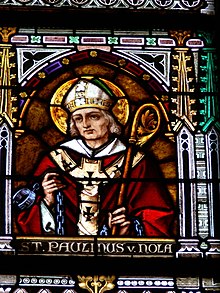St. Alban, First Martyr of England, a.d. 303. and St. Paulinus, Bishop and Confessor
by VP
Posted on Saturday June 22, 2024 at 12:00AM in Saints

"So great was the glory of this first martyr of our country, that his name was famous over the whole Church. He was as yet a pagan, when the edicts of the Roman emperors against the Christians began to be put into execution in Britain. A certain priest sought by flight to escape the persecutors, and Alban afforded him a shelter in his house. He was much edified by the holy deportment of the stranger, and admired his faith and piety, and in particular his assiduity in prayer. Alban listened to his instructions, and in a short time became a Christian. Information was soon given to the Roman governor that the priest lay hid at the house of St. Alban. Soldiers were sent to search for him; but St. Alban changed clothes with his guest, that he might more easily escape, and he himself put on the garment worn by the priest. In this dress he presented himself boldly to the soldiers, and was by them led to the judge. He was highly provoked to find the cheat which the saint had put upon him, and ordered him to sacrifice to the pagan gods. Upon his heroic refusal, the judge commanded him to be scourged; and seeing him bear with unshaken constancy, and even with joy, the most cruel torments, he at last condemned him to be beheaded.
The saint, impatient to obtain the crown of martyrdom, by his prayers dried up the river, so as to afford a passage for himself and a great multitude who went out to witness his execution. At this miracle, the executioner was converted, and throwing away his sword, fell at the saint's feet, begging to die with him, or rather in his place. Another executioner was called in, who struck off the head of the martyr; but his own eyes fell to the ground at the same time. The first executioner who had declared himself a Christian was also beheaded. They suffered on the 22nd of June, according to most authors in the year 303, and at the place where the town of St. Albans now stands.
Pray for your country, that God may bless it with the love of justice and truth. Pray for all who suffer for the faith, and beseech God to give you the courage and constancy of his primitive servants.

"ADVANTAGES DERIVABLE FROM ADVERSITY. - Paulinus was born at Bordeaux in 353. He reckoned among his ancestors a long line of senators, and his father was prefect of Gaul. He had as preceptor the celebrated Ausonius, and at the age of twenty-five became prefect of the town of Rome. Theresa, belonging to one of the most noble families in Spain, brought him a large accession of wealth in marriage. He was at the height of worldly dignities when sudden changes happening in the empire snatched from him all his honours and a goodly portion of his wealth. Paulinus and Theresa thereupon, apprehending the nothingness of the things of the world, sold the remainder of their possessions in favour of the poor; Theresa dedicated her life to their service, and Paulinus embraced the religious state. His great virtue soon rendered his name famous, and caused him to be raised to the bishopric of Nola. This town, which was devastated by the Goths a year afterwards, stood in need of such a bishop, to prevent its entire destruction. He became the providence of the poor and the unfortunate. Although poor himself, he always found means to give in abundance. St. Paulinus died in 431.
MORAL REFLECTION.-We read in the book of Proverbs:
"Whom the Lord loveth He chastiseth, even as a father the son in whom he
delighteth."-(Prov. iii. 12.)" Pictorial Half Hour with the Saints by Fr. Lecanu
